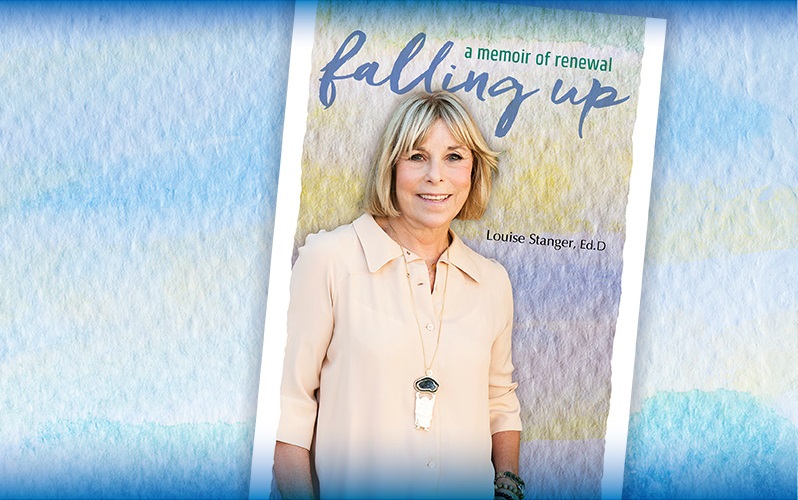Louise Stanger is a speaker, educator, licensed clinician, social worker, certified daring way facilitator and interventionist who uses an invitational intervention approach to work with complicated mental health, substance abuse, chronic pain and process addiction clients.
The following is an excerpt from my book, Falling Up: A Memoir of Renewal.
I owe a great debt of gratitude to Alan David Stanger, a raucous gentlemen. Neither of us was strong enough, savy enough or smart enough to say goodbye. We had simply reached a truce and were respectful to one another. I was struggling to increase my University time; he was busy trying to figure out his practice.
We both knew it was over.
His death – sudden and tragic – was heralded as a grand community loss. What about the gift he gave us? Those near and dear asked about him. It was like headline news, fibrillating with drama, confusion, status, false money, loss: those were the unspoken sweetly bitter gifts of his legacy.
Being a widow is no easy task as the world becomes confusing and there are no guideposts. People respond in strange and confusing ways. Old friends disappear. New friends appear like poppies across an open field. Widowhood is such a non-status status laden with interminable decisions over what to do with your wedding ring, clothes, personal belongings, how do you sleep, child rearing, etc. You become the ultimate decision maker – sex, dating, and economic shifts all hit you like a tsunami.
Denial is a friend that mercifully cushions you. It’s the body’s shock absorbers designed to soften the blow. Denial loses its charm when it overstays its welcome and forbids the body to move forward and start living again.
Once again I found myself on autopilot floating through uncharted waters. It was only later as a doctoral student that I had the honor and privilege to follow and interview hundreds of young widows for my dissertation, a topic I am deeply passionate about. Black, tan, rich, poor, Jewish, Buddhist, Atheist, Christian – these women came from all backgrounds. This is where I learned we are not alone.
Young widows I encountered travel different paths. Each was “emotionally unintentionally unavailable” at the moment of impact to their children. Each found new freedoms and distinct ways of navigating. Some achieved new professional heights while others got lost along the way. A few found their voices and did what they wanted to do, ate what they wanted to eat, cleaned when they wanted to clean, danced like there was no tomorrow. Supernatural occurrences were commonplace. Women reported they danced with cheetahs in their dreams, saw their husbands in fleeting moments, and stories of articles of clothing mysteriously moving in houses signifying a presence. Lights flickered, night visitations and clocks stopped at 11:11.
And if you’re experiencing loss and have children, what to tell them and how to deal with their myriad of questions, fears and ghosts can become challenging. Make no mistake death is different than divorce. With death, one competes with a ghost, in divorce one is alive and kicking. In death, age is frozen while your wrinkles continue to bloom.
Sex took on different personas. For some – as I learned interviewing widows – having intercourse made them feel alive. For others, they were so numb to stimuli around them that they couldn’t feel it even if they tried. There are no right or wrong answers when death happens. The textbooks say “no big changes for a year.” What an egregious oxymoron. Change is the omnipresent energetic state in existence – financial situations change, health issues appear, children act out, work takes hold and people change.
Make no mistake, the changes one feels as a widow are normal. Doctors are often in their own discomfort quick to treat grief as a pathological phenomena, which requires medications like antidepressants, valium and ambien for sleep. But–grief, as I know it, experienced through the voices of many, is not pathological. It’s your body’s way of dealing with loss.
There are all sorts of grief groups, online chat rooms and forums and clinicians who can help you on your way. Still, grief can be a deceptive son of a bitch – it is best tamed when you surrender and feel your feelings.
When I lost my husband, it felt like life was over, as if I had died. So I vacationed to the desert to start my journey through grief. Out in the open, the wide expanse that has heard the voices of breaking souls, seen their faces, whispered to cracking hearts and bleeding eyes, I was free. I know that I began to heal when I became available to others. No longer self-absorbed in the aftermath of activities, I could feel the numbness giving way to a symphony of emotions. I was not dead.
I was alive!
To learn more about Louise Stanger and her interventions and other resources, visit her website.


